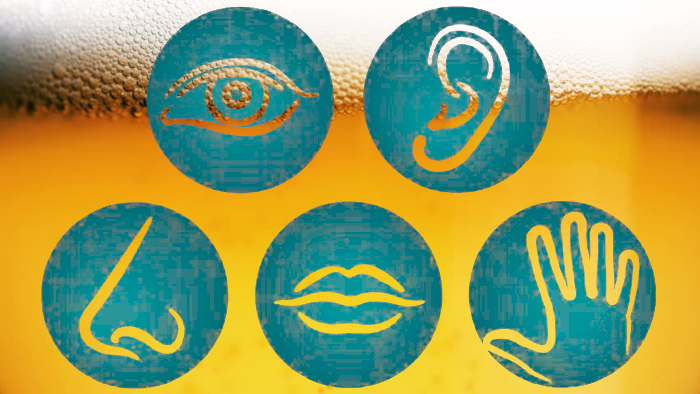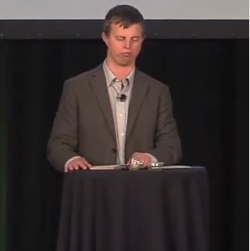About 200 people are sitting with me in a conference room at the 2019 California Craft Beer Summit. We are all waiting to hear from Dr. Hoby Wedler, a renowned speaker in sensory perception and integration, about one of our favorite topics – beer! In fact, we are also going to evaluate a few beers.
Educated beer drinkers are taught some basic steps for evaluating beer. These basic steps are:
- Swirl and smell the beer for aromas (do this step first because some aromas are volatile and won’t last)
- Look at the beer and examine color, clarity, head retention, carbonation and lacing
- Sip the beer for an initial taste perception, as well as examine mouthfeel sensations
- Sip again and get the aromas to volatilize into your nasal cavity to maximize your taste perception
- Swallow and evaluate the finish
- Revisit and analyze all the above to score or rate the beer
Collectively these steps help you determine the flavor and quality of the beer. And ideally, these steps ultimately involve you using all five senses – sight, smell, taste, touch (or feel), and hearing. But could your senses conflict or even result in sense deception?
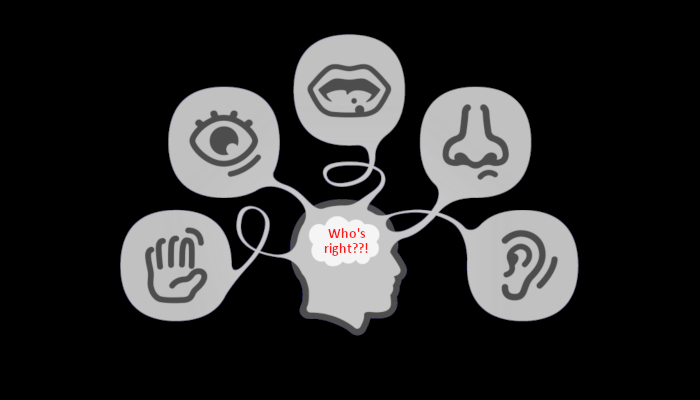 Can your senses conflict? Yes! Click here for an example.
Can your senses conflict? Yes! Click here for an example.
In the book “Beer Pairing: The Essential Guide from the Pairing Pros” (Voyageur Press, 2015) by Julia Herz and Gwen Conley , the authors state “…never forget that flavor starts with your eyes………Time and again studies have proven that people have preconceptions about an item’s flavor based solely on the appearance of that item.” For example, three studies performed by J.E. Smythe, M.A. O’Mahony and C.W. Bamforth involving test groups in the U.S. and Scotland demonstrated that beer color influenced the test subjects’ preconception of beer flavor and quality.
So, in order to hone our beer senses, 200 people at the California Craft Beer Summit are set to taste beer wearing blindfolds. And Dr. Hoby Wedler leads us through using our four other senses.
Who is Dr. Hoby Wedler ?
Dr. Henry “Hoby” Wedler is an American chemist and entrepreneur. He graduated from the University of California, Davis (UC Davis) with a BS Degree in Chemistry and a PhD in Computational Organic Chemistry.
While in graduate school, Hoby started the “Tasting in the Dark Program” with Francis Ford Coppola at Coppola’s winery. The goal was to “develop a unique way to share knowledge about Coppola wine production and bring the tremendous variety of these exceptional wines closer to the consumer through tasting events.” So Hoby created a wine tasting experience using the blindfold approach as a powerful way to focus on other senses instead of the dominating sense of sight. The blindfold created a means to discover and highlight the many other experiences a product like wine had to offer. The first blind tasting session premiered in 2011 with much success. He now conducts these blind tasting sessions around the globe. Sierra Nevada and other breweries have employed his services.
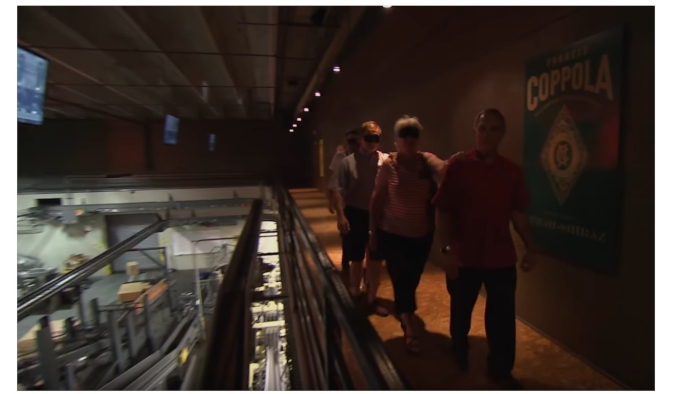 Coppola Winery visitors take a tour in the dark.
Coppola Winery visitors take a tour in the dark.
Since that time and upon graduation with his PhD, Hoby literally made it his business to assist other companies improve their brand and product alignments with consumer multi-sensory perception. In 2017, Hoby co-founded Senspoint Design. And recently Senspoint Design merged with Tucker Creative and others to create SENSPOINT, a full-spectrum design company with a distinct focus on telling stories that create truly memorable experiences using all five senses. The result allows companies to enhance their brands/products by aligning them with multi-sensory stimuli that deliver distinct and compelling consumer experiences.
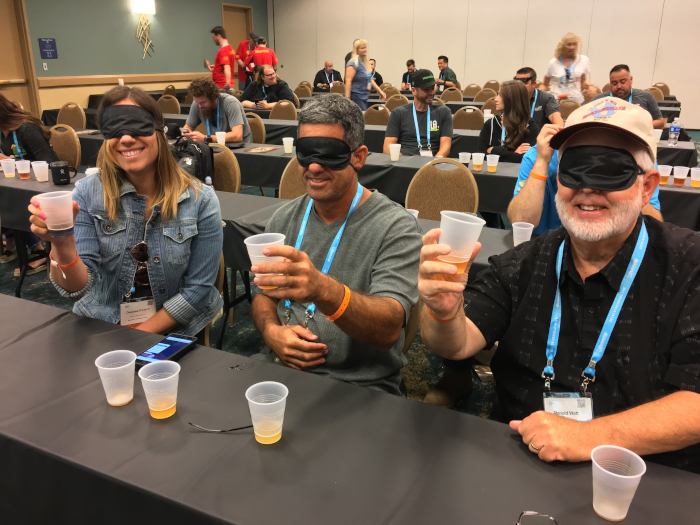 Beer tasting in the dark at 2019 California Craft Beer Summit.
Beer tasting in the dark at 2019 California Craft Beer Summit.
In addition, Hoby also serves as a motivational speaker, a mentor and educator. In his work and presentations, he focuses on a unique trilogy between sensory awareness, scientific knowledge, and a love for sharing his insights. He has been featured on TEDx Talks. In 2016, Forbes recognized Dr. Hoby Wedler as one of their 30 Under 30 in the Food and Drink category, emphasizing his role in leading tasting in the dark programs. And the Sacramento Business Journal honored Dr. Hoby Wedler with their 40 Under 40 award.
By any measure, Hoby’s education, accomplishments and accolades are impressive. They are even more impressive when you learn that Hoby has been blind since birth. Said Hoby, “I really think that all of us have vision but some of us lack eyesight.”
As part of his “vision”, Hoby founded and directs the nonprofit organization Accessible Science. Accessible Science provides blind or visually impaired youth with the knowledge and tools necessary to participate in science without the use of eyesight. As a result, in May of 2012, Hoby was one of only fourteen individuals honored at the White House as part of President Obama’s Champions of Change program, for leading the fields of science, technology, engineering, and math (STEM) for people with disabilities. The Champions of Change program was created as a part of President Obama’s Winning the Future initiative that recognizes outstanding individuals for the work they are doing to serve and strengthen their communities.
A Conversation with Dr. Hoby Wedler
Any conversation with Hoby Wedler results in a clear understanding of his love of science, insatiable curiosity and overall energy. Hoby said, “As a blind person, some might think of my lack of eyesight as a limit. But it has made my world drop limits. I feel like the world is so open to me.”
For instance, at the start of our phone conversation he immediately inquired about about my previous space systems engineering background. Further, he spent the next 15-20 minutes quizzing me about satellite orbits and satellite communications. His passion to learn is unrelenting.
Early Years and Family
I asked Hoby about the role his family played in his growth. Both of Hoby’s parents and his older brother are sighted. When Hoby was born, his Mom (a teacher) decided to study how to be a teacher of the visually impaired. Prior to Hoby’s birth she had no specific skills in this area. After studying, she became a teacher for the visually impaired for 20 years. His Dad and older brother were both very supportive also.
Hoby explained, “My parents were very supportive and still are of whatever the heck their children wanted to do. They guided me in a sense of being practical in my choices and in what I do. They definitely had high expectations for both my brother and me. My brother is sighted and two years older than me. So in a sense he sort of paved the way for me…. They always pushed me to challenge myself. And that’s why I really love taking on challenges. I’ve always challenged myself my whole life Including getting a degree in science and getting a PhD in science and starting a few businesses.”
About His Passion for Science and Achieving Chemistry PhD
Although his parents are not scientists, Hoby discovered his love for science at an early age. Hoby said, “I was always interested in how things worked.”
A high school teacher initially got Hoby excited about chemistry. However, while at high school other science teachers dissuaded Hoby from pursuing chemistry by advising that his blindness made laboratory chemistry an impossibility. Initially dissuaded from pursuing a college science major due to such concerns about his disability, Hoby studied US history as his major with chemistry as a minor at UC Davis.
But then Hoby met Professor Dean Tantillo. Tantillo saw the possibilities and worked alongside Hoby to support his education. With Tantillo’s support, Hoby started and completed a PhD in Computational Organic Chemistry at UC Davis.
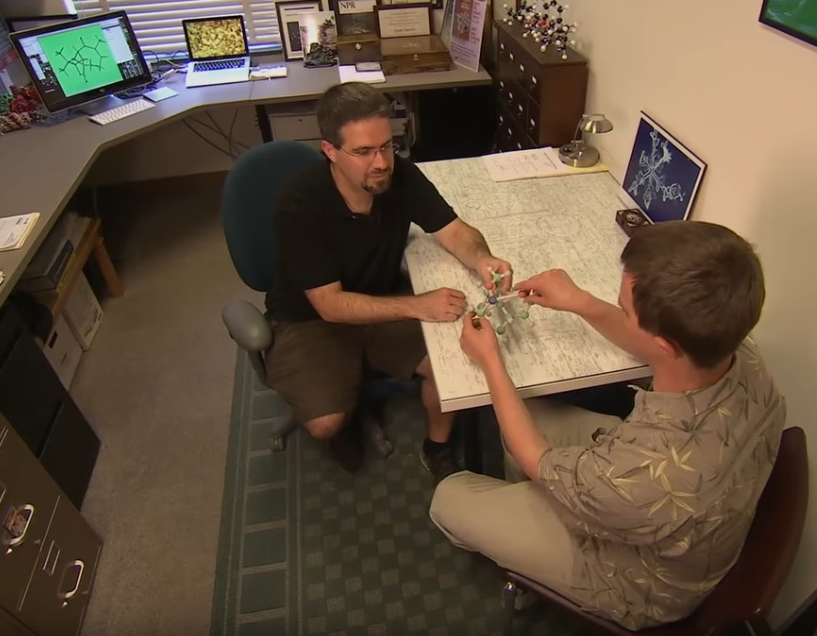 Professor Dean Tantillo and Dr. Hoby Wedler examine and discuss a 3D molecular model.
Professor Dean Tantillo and Dr. Hoby Wedler examine and discuss a 3D molecular model.
As a result, Dr. Hoby Wedler’s research output has included journal articles advocating practical approaches to make chemistry research possible for the visually impaired, discussing education, safety, software and even the functioning of service animals in the lab. His work includes involvement in the creation of software to extract 3D printable-models of molecules from 2D maps available in the chemistry science literature. Furthermore these models are annotated in braille with information such as bond length. In addition, Hoby has conducted computational chemical analysis of the compounds involved in the flavoring of wine, as well as markers for the refinement of olive oil.
Starting Tasting in the Dark at Francis Ford Coppola Winery
Hoby remarked, “It was a great opportunity to work with them. And I still work with them from time to time….My work with them helped me further understand how I perceive the world using my non-visual senses. What it really led me to understand is that I sort of have an awareness that maybe other people don’t have. And also, that my awareness could help them understand their products better.”
On Sensory Literacy and Its Importance
Hoby explained, “My notion of sensory literacy is the ability to take information from all our senses and collectively process that information to make meaningful decisions. People do this with just their eyesight all the time….I believe that sensory literacy is the ticket to being truly aware. And I believe that awareness is the foundation to being inclusive.”
About SENSPOINT
“SENSPOINT is really a creative company where we use all five senses in our process. And we use awareness in our process to make sure that look is matched up well with the taste, smell and feel of products to create unique and wonderful designs.”, noted Hoby.
In that vein, SENSPOINT has supported a wide array of companies in the wine, beer, cider and spirit beverage industry. Past customers include Francis Ford Coppola Winery, Sierra Nevada Brewing, Lagunitas Brewing, Dust Bowl Brewing, and St. Agnes Distillery – just to name a few. Food industry customers include Barilla Inc. (pasta and sauce) and Pinnaroo Hill Olive Oil.
But SENSPOINT’s customer base is not just anchored in the food or beverage industry. For example, SENSPOINT worked with a Japan-based glass manufacturer with a focus on producing a large portion of the world’s glass in predominantly the building, automotive, and consumer electronics industries. SENSPOINT’s task was to develop metrics for describing glass textures.
And SENSPOINT is evolving its focus. Hoby emphasized, “What SENSPOINT is going to become more or less is a company that helps other companies in a creative or strategic sense. Our focus also includes making the world a more accessible place for all of us – helping companies who support seniors, helping companies who support the visually impaired, and other related industries.”
Creating an at Home Tasting in the Dark Experience
I asked Hoby to recommend fundamental steps in setting up an at home tasting in the dark experience with family or friends. He suggested:
- Use a variety of beers (perhaps 5 dissimilar beers)
- Don’t let the participants know what the beers or beer styles are
- Have participants put on blindfolds
- Try the beers – think about the aroma, taste and texture
- Focus on how the beer feels as it moves from the front of your pallet to the back of your pallet
- Describe the beers and then compare your perception to the actual beers
Hoby further explained sensory awareness, “It’s all about being mindful of what sounds you hear, what you are smelling, tasting or touching. Force yourself to not just use your eyesight to judge your environment. Take time to exercise each of your senses. Try to establish a set of mnemonics for your sensory inputs to help you recall the smells and with other senses.”
Dr. Hoby Wedler – Inspiring Others to Broaden Their Perceptions and Inclusiveness
Hoby Wedler provides a living example that our world can be limitless by pushing ourselves to accept and conquer new challenges daily. And at the same time, we need to use and focus all of our senses to appreciate our world. As Hoby said, “… sensory literacy is the ability to take information from all our senses and collectively process that information to make meaningful decisions. People do this with just their eyesight all the time….I believe that sensory literacy is the ticket to being truly aware. And I believe that awareness is the foundation to being inclusive.”
